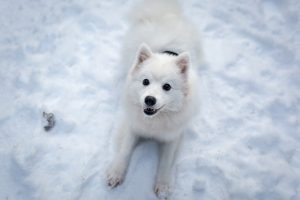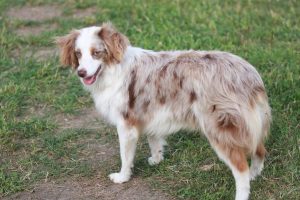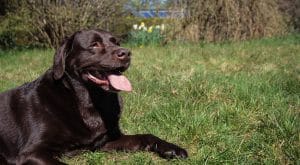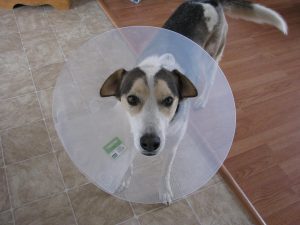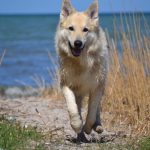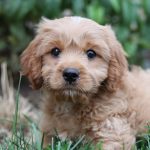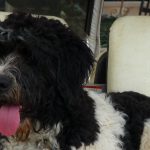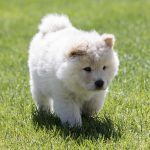Loving! Adorable! Couch Potato! Just to cut the long story short, it’s Groodle.
Known as Goldendoodle outside Australia, it is a crossbreed of Poodle and Golden Retriever. Some other less popular names for this dog are Golden Poo, Curly Golden and Curly Retriever.
Groodle is an ideal family dog that creates a strong bond with each family member. If you have planned to get this adorable dog and looking for a comprehensive guide on the breed, you are just in the right place.
In this article, you’ll find every important fact and detail about this breed including features, grooming needs, temperament, health-related issues, pros and cons, FAQs and much more.

Table of Contents
Introduction and History
They are usually known as Goldendoodles in other parts of the world but Australia has its own charm which is why they are named differently. Currently, they are among the top 10 popular breeds in Australia and you can easily find a Groodle puppy but it’s always recommended to get a puppy from a licenced and ethical Groodle breeder.
As one of their parent breeds; Poodle comes in different sizes from miniature to large, Groodles too come in various sizes when crossbred with them. So, you can choose a large or a small dog, whatever fits easily in your home.
This dog was intentionally bred in 1969 by Monica Dickens, the great-granddaughter of Charles Dickens. She wanted to develop a dog with the qualities of both a poodle and a Golden Retriever; which resulted in Groodle. Later, breeders and experts in the United States and Canada bred Golden Retrievers with Standard Poodles specifically to develop a hypoallergenic dog breed for visually impaired people who also had allergies.
Features and Specialties
By nature, they are like Golden Retrievers as they are loving and friendly not only with their humans but with everyone. On the other side, they inherit intelligence and low to non-shedding coats from Poodles, which is why they make an ideal family dog that is easy to train.
Whether you need an ideal couch dog or pure velcro, Groodle has got your back. It does well with its immediate family, guests, strangers, kids, elders and other pets.
Physical Appearance and Body Features:
Weight and Size: It may grow from 14 to 21 inches in height and can weigh up to 50 pounds. You may expect different sizes and weights in different puppies though.
Colours and Coat: Their coat may resemble any of their parent breeds and they may have either a straight, wavy or curly coat. They come in a variety of colours and patterns including Chocolate, Gold, Cream, Gray, Black, Apricot, Red and Brown.
Eyes: They mostly have brown or hazel eyes but you should expect some other colours too. Also, the puppies may change their eye colour till the age of 16 weeks.
Lifespan: A Groodle’s lifespan is 12 to 15 years but it may live for a bit longer if it doesn’t develop any serious health issues.
What’s good and what’s bad about them?
It is good to know about their pros and cons before you get a puppy so you prepare yourself and your home for the new puppy accordingly. Given below are the most common traits to confirm. Let’s start with the Groodle pros.
Pros of having a Groodle
Low-shedding Coat – They may have a low-shedding coat, the breeder may not be able to predict it though. It all depends on the tendency of the parent breed. Dogs with a low-shedding coat are ideal for owners and/or families with allergies.
Highly social with other pets, strangers and kids – Their friendly attitude toward everyone makes them the best dog for families.
Easy to train – Their intelligence lets them understand your commands quickly which is why they are easily trainable dogs. But hard work and patience are recommended during the training sessions.
Cons of having a Groodle
Daily exercise needed – They need to be exercised regularly. Due to lack of exercise, they may develop health and behaviour issues. So, they are not suitable for busy owners.
Large-sized Groodles may not feel good in small apartments – Standard Groodles should be kept in homes with backyards so they can play with full authority.
Separation anxiety – Becomes aggressive and destructive sometimes if left alone.
Generations of a Groodle
A Goldendoodle or a Groodle has different generations. Let’s find facts about them below.
F1 Generation
An F1 Goldendoodle is the result of breeding a purebred Golden Retriever with a purebred Poodle. These dogs are 50% Golden Retriever and 50% Poodle, and they are considered first-generation Goldendoodles. They are the healthiest in all the Groodle generations as well as intelligent, and loving and may have curly, wavy or straight coats.
F1b Generation
An F1B Goldendoodle is produced by breeding an F1 Goldendoodle with a purebred Poodle. This breeding results in a dog that is 75% Poodle and 25% Golden Retriever. F1B Goldendoodles are most likely to have hypoallergenic qualities, as they have a higher percentage of Poodle genetics.
F2 Generation
An F2 Goldendoodle is the offspring of two F1 Goldendoodles. In this generation, the genetic makeup is 50% Golden Retriever and 50% Poodle, just like the F1 generation.
F2b Generation
An F2b generation may be the mixture of different Groodle generations such as an F1 and F1b or an F2 and F1b. Most of the time, they are hypoallergenic but their appearance and other traits may be a bit different.
It’s important to note that while these are the common generations, there can be further variations depending on the specific breeding pairings. Each generation may have different traits, including coat types, sizes, and temperaments, so it’s essential to research and understand the characteristics of the generation that best fits your preferences, lifestyle and needs before acquiring a Goldendoodle.
Behaviour and Temperament
They are friendly, social and intelligent. They inherit their fun-loving trait from Retrievers. You can easily train them and yes, the experts recommend them as one of the best family dogs. They are totally non-aggressive against strangers, children and other animals.
Just like Retriever, they are always ready to please their humans and interact with them during all their activities. Whether you swim, run, exercise or walk, the Groodles have got your back. You’d be shocked to know that they are usually described as “Bomb Proof” because of their temperament and calmness.
A Groodle is considered one of the most gentle dog breeds. Moreover, it’s obedient and friendly. You won’t feel lonely even on the moon if this adorable pup is there to accompany you.
Because of their smartness and intelligence, they are ranked as the 4th smartest dog breed in the 150 smartest breeds. The only drawback of having a Groodle is that they can’t be good guard dogs.
Exercise:
At least 30 minutes of daily exercise is required for Groodles or they may get bored. They love swimming, walking, running, and any activity that will help them burn their energy. Remember, every dog needs exercise, and if not exercised daily, they may develop several problems including harsh behaviour and destructive chewing.
Training:
With plenty of intelligence, they won’t give you a tough time during the training, so they are highly recommended for first-time dog owners. Don’t forget to encourage them with treats during the training sessions.
Experts always recommend training them from an early age, just some basic training, so they’ll develop the habit of being trained in their adulthood. Along with that make sure you crate train, potty train and socialize them well.
Feeding and Diet:
Well, a balanced diet is necessary for any type of dog from an early age; therefore, a Groodle puppy also deserves the best food for him. The best diet for a Groodle includes vitamins, fats, minerals and proteins.
You may consider feeding them boiled chicken, turkey, white and brown rice, yogurt, eggs and many other foods. Don’t try to feed him raw as it may have bacteria that will affect his health. 1-4 cups of food are enough daily and it should be split into 2-3 meals.
Don’t feed them with the same food every day, try to add some variety and special treats at least once or twice a week.
Grooming:
Brush and Bathe: As Groodle doesn’t shed much, you are recommended to brush them at least twice a week. Moreover, bathing is not necessary until your dog needs it to get rid of mud after a hike in muddy areas.
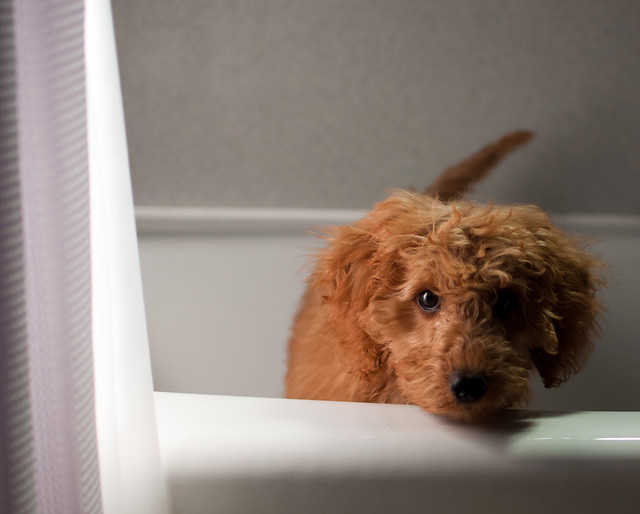
Nails: Usually their nails are filed down by themselves if they exercise frequently. Still, their nails should be checked once every month to make sure they aren’t too long.
Ears: It’s good to check their ear twice or thrice a month for any redness, and if found, it may be an infection that should be treated timely.
Requirements for a living:
A home with a small yard suits them better where they could burn their excessive energy running in the backyard.
You can also have a Groodle pup if you live in a small apartment but make sure to give them regular exercise and walks. Being a puppy, they spend most of their time sleeping like other breeds, so don’t get worried about that.
Moreover, they can easily be adjusted to all types of families including kids, elders, and other pets.
Health Issues:
The crossbred dogs may inherit health-related issues from their parent breeds, likewise, Groodles may also develop some illnesses. Moreover, if their parent breeds are not screened well before the cross, that too can lead to genetic problems. Given below are some of the major health conditions a Groodle may have:
Epilepsy:
Groodles may be easy victims of epilepsy because both of their parent breeds are prone to it. If suffering from epilepsy, the dog usually shows odd behaviour and may collapse because of the severe conditions. It’s recommended to see your vet immediately if you witness these symptoms.
Separation Anxiety:
They love their owners like anything but sometimes they may suffer separation anxiety if their owners leave them for a short or long period. The common symptoms of separation anxiety are excessive barking, growling, destructive chewing and aggressive behaviour.
Hip and Elbow Dysplasia:
Both of these conditions are usually inherited from their parent breeds. Hip dysplasia is a condition in which the dog’s thigh bone does not fit into the socket while Elbow dysplasia may develop when the elbow joint has some growth disturbance.
von Willebrand’s Disease:
It’s a blood clotting disorder that may lead to severe bleeding if they meet an accident or after major surgery.
Necessary Health Testing Requirements:
To avoid any health or genetic issues in the puppies, it is very important to do some tests of both the parent breeds, as well as, Groodle puppies. Usually, a good breeder will do the following health tests.
Health Tests for Poodles (Before Breeding):
– Von Willebrand disease I and II
– Hip and Elbow Dysplasia
– Degenerative Myelopathy
– Heart Diseases
– Osteochondrodysplasia
– Progressive Rod-Cone Degeneration
– GM2 Gangliosidosis
Health Tests for Golden Retrievers (Before Breeding):
– Hip and Elbow Dysplasia
– Ichthyosis
– Progressive Rod-Cone Degeneration
– Dystrophic Epidermolysis Bullosa
– Heart Diseases
– Sensory Ataxic Neuropathy
– Progressive Retinal Atrophy – Golden Retriever Type 1 and Type 2
Health Tests for Groodles:
– Hip and Elbow Dysplasia
– Neonatal Encephalopathy with Seizures
– Von Willebrand disease I and II
– Degenerative Myelopathy
– Progressive Retinal Atrophy – Golden Retriever Type 1 and Type 2
– PRA, Progressive Rod-Cone Degeneration
Comparison with other Poodle crosses (Oodles):
Poodle crosses that are also known as Oodles, share most of their traits and have fewer differences. So, we have compared Groodle with other Oodles so you have an idea of which one is suitable for you.
As a Therapy Dog:
Like Poodles, they come in a variety of sizes and can easily be adjusted with any type of house. They are affectionate, extra-smart and loving. Also, an ideal therapy dog should have several qualities such as the desire to please, trainability, loyalty, patience and temperament. And Groodles have all such qualities so they can become ideal therapy dogs for owners of all ages that have special needs.
Where to get a Groodle puppy:
According to experts and vets, you should get a puppy from a reliable breeder. Dozens of backyard breeders and puppy factories breed their dogs for the sake of money. You should avoid them and instead go for a reputable Groodle breeder who takes care of every single thing including vaccinations and microchips.
Litter Size and Puppy Price:
On average, a Groodle may give birth to 3-8 puppies in a single litter. When it comes to price, it depends upon the reputation of the breeder, as well as, bloodline, location and colour.
When it comes to price, a puppy may cost you between $2000 and $6500. If you are planning to adopt one from a shelter, it may cost you no more than $500 depending on the availability. We recommend you find one in a dog shelter first, and if found, get that instead of getting one from a breeder.
Recognition of Groodle:
Dogs Queensland:
Dogs Queensland is the canine body in Queensland that recognizes and registers purebred dogs, and unfortunately, you cannot register a Groodle with them because it is a mixed breed.
Other Kennel clubs around the globe:
The American Kennel Club, the UK Kennel Club, and the Canadian Kennel Club do not recognize Groodle. While the American Canine Hybrid Club recognizes mixed breeds so you can register your puppies with them.
If you live in a country other than the United States, Canada and the United Kingdom, check with your local kennel clubs and authorities regarding registrations.
Groodle FAQs:
Are Groodles and Goldendoodles the same?
Yes, both of them are the same breed. In Australia, they are called Groodle while in other countries such as the US and the UK, they are known as Goldendoodle.
Are Groodle dogs good with children?
Yes, they have an exceptional temperament and they are excellent with children. Still, if you have infants, keep them supervised while playing with your pups.
I am interested in getting a Groodle, how do I choose the right breeder?
Whichever breeder you choose, try to visit their premises and meet the parents. Also, a professional and well-reputed breeder will provide you with health certifications and guarantees, and/or references to the older clients. Also, check this detailed post on the questions you should ask the breeder.
Does the Australian Nation Kennel Club (ANKC) recognize the Groodle dog?
No, mixed or crossbreeds are not recognized by ANKC and you can’t register them.
Are Groodles completely Hypoallergenic?
They are among the most low-shedding breeds but not completely hypoallergenic. In fact, none of the dog breeds is completely hypoallergenic but they shed too little, so it is assumed that they don’t shed at all.
Are Groodles and other Doodles the same?
No, they are different. Even the puppies from the same litter may have significant differences.
Final Thoughts:
Undoubtedly, Groodle is one of the best dog breeds that you may get. But make sure you get one from a reputable breeder and check its parents before making any decision. If you still have any doubts, confusion, or questions regarding the Groodle dog breed, feel free to comment below.
Also read: Ideal Dog Breeds for You Based on Your Birth Month
Image credit: Pixabay, giustina_ilyusha, giustina_ilyusha, rkleine, rkleine


